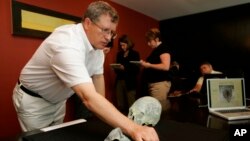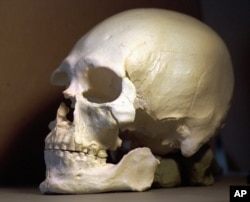The much-anticipated results of a study of DNA taken from the hand bone of the so-called Kennewick Man, a 8,500-year-old skeleton discovered in Washington state in 1996, suggest the man was most closely related to Native American populations, a team of international researchers said Thursday.
The DNA findings, published online in the journal Nature, contradict a 2014 study based on anatomical data that suggested the skeleton was most closely related to Japan's indigenous Ainu or Polynesian populations.
The Kennewick Man, named for the site of his discovery near the banks of the Columbia River in Kennewick, Washington, has been at the center of a bitter legal dispute between scientists, who want to study the remains, and a coalition of Native American tribes, which is arguing for their reburial. The dispute ended in 2004 with a ruling in favor of more research.
Dr. Eske Willerslev, a University of Copenhagen geneticist who led the latest research, said he believes the findings settle the argument over the Kennewick Man's origins.
"The Kennewick Man's closest living relatives are Native Americans," Willerslev said in an email to Reuters.
The researchers compared DNA extracted from a hand bone of the skeleton to that of modern Native American tribes and other world populations and concluded the Kennewick man was only distantly related to populations other than Native Americans.
In fact, the skeleton's DNA most closely matches some members of the Confederated Tribes of the Colville Reservation, which have been arguing for rights to the remains. However, the study could not offer a conclusive match, and the authors said more modern ancestors could surface as more Native American groups' DNA is sequenced.
It is not clear whether the findings will be sufficient to resolve the conflict over the disputed remains, one of just a few well-preserved North American skeletons older than 8,000 years and one of the only good examples from the Pacific Northwest.






